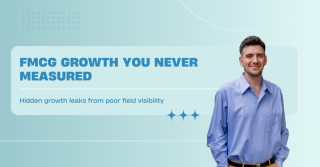Traditional Field Sales Techniques Dead ? Why Field Sales Apps Are The Future ?

The landscape of sales has undergone a transformation over the past decade. Once reliant on handshakes, the charismatic patter of the traveling salesperson, and reams of handwritten notes, sales have dived headfirst into the digital deep. We are well into the era where field sales techniques are undergoing unprecedented changes, and it’s high time businesses reevaluate their strategies.
In this blog post, we’ll dissect the trajectory of field sales from past to present and project into the future of this essential business function. Our focus is particularly on the role of field sales apps and how they’re not just a trend but a fundamental shift in the fabric of sales strategy and execution.
1. Introduction
Gone are the days when sales representatives spent the majority of their time wading through the drudgery of data entry and chasing leads. Enter the dynamic world of Field Sales Apps—streamlining processes, enhancing customer experiences, and transforming how sales teams engage with their prospects and customers.
2. The Decline of Traditional Field Sales
The traditional field sales model is showing its age, and several factors can be attributed to its slow decline. With digitalization, customers are smarter, more informed, and demand a different kind of interaction. Add to this the burden of high travel and accommodation costs for sales teams, and it becomes clear that the field sales playbook is in need of an overhaul.
The Trouble with Tradition
One of the most evident challenges is the slow, manual processes that delay sales cycles and frustrate both customers and sales reps. The lack of real-time data for decision-making and the arduous task of tracking and reporting sales activities lead to inefficiencies and missed opportunities.
3. Rise of Field Sales Apps
Field sales apps, like Delta Sales App,sales diary, and field sense, are changing the game by taking the repetitive, mundane tasks off sales reps' plates, allowing for a more impactful use of their time.
Redefining Efficiency
Imagine having customer data, sales histories, and inventory management all at your fingertips. Field sales apps make this dream a reality, providing a comprehensive view of the sales process that can be updated and accessed in real-time.
Adaptability at Its Core
Field sales apps adapt to different sales scenarios, helping sales reps with territory planning, route optimization, and enhancing in-person interactions with intelligent, data-backed selling suggestions.
4. The Future of Sales: Integrating Field Sales Apps
The trajectory of sales is irrevocably pointing towards a more integrated, app-driven future, as companies across domains and scales have begun recognizing the inherent value of making the switch.
Evolving with the Tide
Forward-thinking companies are already integrating field sales apps with their CRMs, ERPs, and other essential business systems to gain a 360-degree view of their sales operations.
The transformation is under way.
The success stories of companies that have adopted field sales apps are not just anecdotes but blueprints for the future. Increased footfall, conversion rates, and customer satisfaction levels point to a future brimming with tech-empowered salespeople.
5. Overcoming Challenges with Field Sales Apps
Integration is not without its hurdles, and companies need to be prepared to tackle challenges head-on to reap the full benefits of field sales apps.
Navigating Implementation
Not all field sales apps are created equal, and the successful transition hinges on careful consideration of factors such as user experience, training, and support.
Sustaining the Transition
The initial excitement of a digital overhaul can wane without the right ongoing support. It’s crucial to have a strategy in place for continual learning, troubleshooting, and adapting to the evolving app landscape.
6. The Role of Data in Field Sales Apps
Field sales apps don’t just modernize—they're a data goldmine, facilitating informed decisions and strategic planning that traditional sales models could only dream of.
Data-Driven Selling
Sales app data gives insights into customer behavior, product performance, and sales trends, enabling targeted selling strategies and maximizing ROI on sales efforts.
A Symphony of Analytics
With analytics features, sales reps and managers can run reports, analyze performance metrics, and build forecasts that are as predictive as they are prescriptive.
7. Conclusion
The advantages are indisputable, and the transition to field sales apps is inevitable for companies vying to stay ahead of the competitive curve. The future of field sales is not a graveyard of tradition but an evolving platform shaped by technology. Field sales apps are more than a convenience. They represent a strategic shift that enhances productivity, drives efficiency, and fosters growth.
For companies still tethered to the past, it's time to cut loose and pave the way for a new generation of sellers. The question is no longer if we should adopt field sales apps, but when and how we can do it most effectively. The time to act is now, and the future is waiting for those who dare to innovate.
FAQs
Q: Why are traditional field sales techniques declining?
A: Traditional methods struggle with slow processes, a lack of real-time data, and high operational costs. Customers are also smarter and demand a more informed approach.
Q: What are the benefits of field sales apps?
A: Field sales apps automate tasks, improve efficiency, and provide real-time customer data for smarter selling. They also optimize routes, streamline reporting, and empower data-driven decision-making.
Q: How do field sales apps improve the customer experience?
A: Sales reps can access customer history and preferences, allowing for personalized interactions. Faster response times and efficient scheduling enhance overall customer satisfaction.
Q: Are there challenges with integrating field sales apps?
A: Choosing the right app with a user-friendly interface and providing proper training are crucial. Ongoing support and adapting to the evolving app landscape are essential for long-term success.
Q: How does data from sales apps benefit sales teams?
A: Sales apps provide valuable insights into customer behavior, product performance, and sales trends. This data empowers targeted selling strategies, maximizes ROI, and allows for accurate forecasting.









